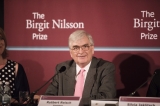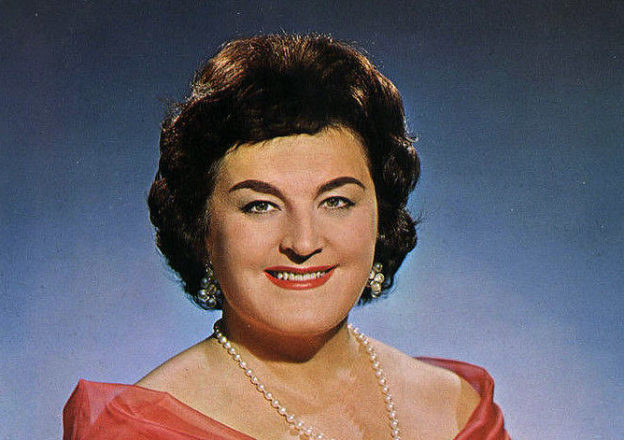A calm and elegant gentleman – who only gets angry when a fellow journalist asks him the reason for such a high amount of the Nilsson prize ($ 1 million) and he then replies with annoyance that « no one asks such questions to players or Nobel laureates: and music does much more for peace compared to what they do! » – Reisch listened to Nilsson for the first time in Vienna in 1965: this was followed by two hundred other live performances, including 35 times as Isolde (« but none was the same as the previous »).
Although aware of the lack of originality of the question, I cannot but ask you the first impression you had when you listened to the voice of the great Swedish singer.
I had never had such a sound experience, and if you ask me to describe it…, well, I can’t: this is the mystery of music, which goes straight to the heart. Describing it would make you lose the mystery, the fascination. I listened to many great singers, and each of them had common technical qualities: but the aspects that made them special were unique and unrepeatable. What was incomparable in Nilsson was the radiance of the voice, and the apparent ease with which it was uttered: on the other hand, she told me that a true magisterium is achieved only with the absence of effort. When you start « hearing » the technique, it’s too late.
Was Isolde really the most successful role by Nilsson?
This is my favourite opera, but the reason why it was Birgit’s best role is that Isolde puts the greatest demands on the singer: for the soprano there is more to sing in the first act of Tristan than in the whole Aida! And a great Isolde must know how to sing pianissimo, overcome a large orchestra, up to the Liebestod: and, unlike the Götterdämmerung, the orchestra is made of layers of silk, not layers of brass!
Birgit Nilsson was not satisfied with her official recordings, because they did not give justice to the size of her voice. So, what choices did you make for the recent Sony box?
The aim was to give a more faithful reproduction of his voice. Nilsson’s voice needed space to expand fully, while listening to it closely — so many among her colleagues told me — it didn’t seem particularly large: this stemmed from her particular vocal technique. Many of the live recordings contained in the box were already known, but the various labels had always taken them from radio sources: we, instead, started from the original tapes. Finally, we can give full justice to the abundance of upper harmonics, to the dramatic stature of Nilsson, who in the recording studio was much less obvious, due to the absence of the public. Moreover, this box casket bears witnesses the absolute perfection of a voice that, for thirty years, has sung a very demanding repertoire, with no compromise
But the voice must have changed over the years!
Certainly, and similarly her interpretation of the characters has evolved: this is why we have included three Tristan recordings of excellent sound quality (Bayreuth 1957, Vienna 1967 and Orange 1973). I also wanted to include a New York Götterdämmerung, but we had copyright problems with the Met. And I would have chosen the Elektra from Vienna, not the one from Montreal, but it was not possible.
A famous sentence by Nilsson is « Isolde made me famous, Turandot made me rich »: how did the Foundation manage the legacy of the singer?
In my opinion this sentence, with the irony that was typical of Birgit, also meant that if you want to sing well Wagner you have to face the Italian repertoire (Verdi, Puccini), in order to develop a perfect legato and flexibility in the singing. Speaking about economic questions, Nilsson’s husband was anything but the typical « diva’s husband »: a very successful businessman (having abandoned his veterinary career), he was able to invest with great skill on the stock exchange and in 2005 he conferred to the Board of the Foundation all the capital, two thirds of which have since then been managed by me. And I think I did quite well, if we managed to cover all the expenses, since then, without touching the capital: the future of the Nilsson Prize is, in my opinion, reasonably assured.
What will be your future role in the Foundation?
I will remain on the Board, as Birgit herself wanted, as long as I can: I believe I have accumulated some experience over the years, and I can assure a smooth transition to the new Academy-led management. After years in which everything has depended strictly on me, it is right to think about the future, to understand when it is time to stop.
As it happened for the Nilsson herself…
True, her husband also feared that her farewell would be painful. Instead, after singing 38 years, she never said to anyone that she intended to quit: she did, and that was it. She even cancelled a Frau ohne Schatten in Vienna because – she said – « I do not want to go to my funeral ». I was present at her last concert, in 1984, even if I didn’t know that it would be her final one: of course, the pitch was less perfect, the pianissimo in the highest notes less sure, but the voice was still there, without oscillation, the treble always imperious, the breath not yet shortened.

























